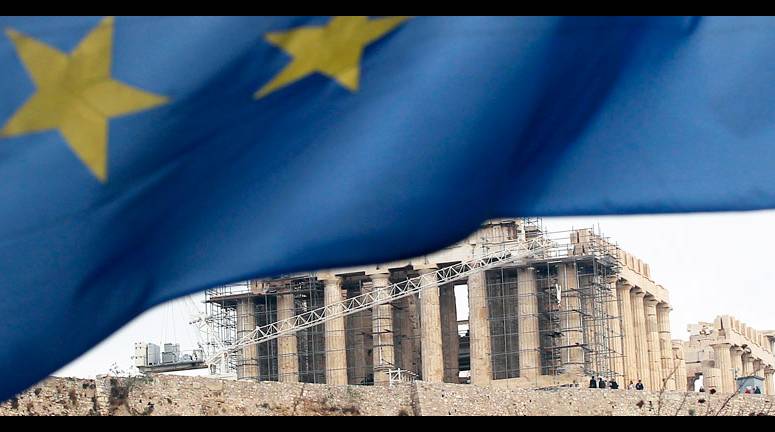«Παρά τη μείωση του βιοτικού επιπέδου κατά 40%, την αύξηση φόρων επτά φορές για τα φυσικά πρόσωπα και εννέα φορές για τις επιχειρήσεις, την επιβάρυνση της ακίνητης περιουσίας κατά 800% και τη ραγδαία αύξηση της ανεργίας στο 26,5%, οι Έλληνες θέλουν «περισσότερη Ευρώπη».
Ο Έλληνας πρώην υπουργός κ. Ευριπίδης Στυλιανίδης αναρωτιέται και αναλύει ποια ακριβώς Ευρώπη θέλουμε και χρειάζεται.
GREECE | ATHENS: The trials borne with great patience by the Greek people in recent years highlight the crisis first and foremost as political and secondarily as financial and work as an alert for a dynamic revamping of the European Vision.
The Crisis is not only Greek, but rather European and international. It began in the USA and was disseminated through Greece into Europe.
Greece, didn’t manage to correct its chronic fiscal distortions until 2009, becoming the Eurozone’s “weakest link”. The self castigating governing decisions of G. Papandreou, sidetracked the country from the strategy implemented by the European South, thus mutating its position from that of the “weakest link” to the “Achilles tendon” of the EU.
The fundamental mistakes of Greek Governments were:
The creation of a large, prodigal, party-influenced public sector.
The transition from the “Real Economy” of K. Karamanlis (1974-1980) to the “Virtual Economy” of C. Simitis, stigmatized by the stock exchange scandal (the most unfair re-distribution of capital in modern Greece), the armament scandals and excessive borrowing.
The inadequate preparation for our accession to the European Monetary Union, favored profiteering by the markets due to price rounding and soaring public expenditure.
The delay of implementing pervasive reforms by K. Karamanlis government, due to handling urgent national issues such as the Olympic Games, the Annan Plan for Cyprus, etc.
Nevertheless, no one can deny the fact that the substantial reform effort begun under the Karamanlis Government, who despite the opposition’s strong reaction, chose the strategy of “mild adjustment”:
The National Bank’s share capital increase and its market opening through the buyout of the Turkish Finance Bank.
The privatization of Hellenic Telecom by Deutsche Telekom.
The privatization of Olympic Airlines.
The privatization of parts of Piraeus port (Cosco).
Educational reform and the breakup of state monopoly on Higher Education, which was opposed by the Socialists.
The successful exercise of Energy and Economic diplomacy towards the Balkan, Asian and Mediterranean Markets.
The rapid infrastructure-driven development as a necessary precondition for investment and tourism attraction (Egnatia Highway).
The K. Karamanlis government implemented reforms while trying to retain the support of the general populous. Through this approach and granted the support of major European players (Merkel – Sarkozy), the said government begun to build a new perception in favor of the “Real” and against the “Virtual” economy which was imposed on the country by a State-dependent and intertwined “economic aristocracy”.
A growth rate above the Eurozone’s average was achieved, which convinced the markets to invest in Greece. Deutsche Bank, Bank of France and BNP bought the largest part of the Greek debt in government bonds.
The country’s debt and the deficit seemed manageable based on rules of measurement acceptable to, and agreed upon by Eurostat.
When the crisis was antes portas, G. Papandreou did not respond to the unifying invitation by K. Karamanlis for the joint application of a National Plan for Fiscal Consolidation and Reconstruction of the country’s productive model. He chose elections instead.
Once in office, and by skillfully questioning the fiscal indicators of the Greek economy, incorporated the IMF in the hard core decision making process of the EU, rendering Greece a “Special case” or even a “systemic danger” for Europe. Thus, the term Grexit was born.
The economic crisis highlighted the political unreadiness of the EU. In 2001 the chance for creating a common Constitution was lost. The Monetary Union followed after Lisbon, without, however, Banking, Fiscal, Economic and ultimately Political Union. The crisis exposed this gap:
Eurostat had not imposed uniform rules for the mapping of national economic data.
European Rating Agencies were not established to respond to the corresponding American ones, when they began downgrading the economies of Eurozone states.
An Internal Support Mechanism was not provided for, resulting in the necessary appeal to the experienced IMF, which is not acquainted with the modus operadi of the European acquis.
The principle of European Solidarity was not applied. The fear of political repercussions created ambivalence in the German government and as a result the crisis was not addressed immediately, taking on rampant dimensions in some cases (Banker Dr. Josef Ackermann at Greek newspapers “To Vima” – 5.10.2014, “Kathimerini”– 20.10.2014).
All of the above stretched the limits of social cohesion, radicalized political discourse, strengthened Euroscepticism and Euro-negativity and shook the relationship of trust between North-South, further, risking European Cohesion.
Operating ethnocentrically, leaderships distanced themselves from the big idea of the Fathers of Europe and made room for the return of populism and National Isolationism which had bloodied our Europe for centuries.
Thus Chancellor Merkel aptly proposed once again the dilemma during the European Elections for “more Europe”. It is, however, an imperative need this to be elaborated by the answer to “which Europe do we want?”.
Despite the decline in the standard of living by 40%, the increase, seven-fold for individuals and nine-fold for businesses, in taxes, the encumbrance of real estate property by 800% and the soaring of unemployment to 26.5%, the Greeks want “more Europe”.
A Europe which, however, will be based on:
The Social Market Economy.
Solidarity and Anthropocentrism.
Protection of fiscal discipline, equality of opportunity, market liquidity, social justice.
Respect of the Member States’ national identities.
The EU needs to configure a common identity collecting the best elements of the national cultures and develop a common destiny which will not only concern the bureaucracy of Brussels, but will inspire, mobilize and respect the people of the “European Confederation”
Πηγή: NEWEUROPE.BE


Δεν υπάρχουν σχόλια για το άρθρο "Ο δύσκολος δρόμος προς την Ευρωπαϊκή Συνομοσπονδία"